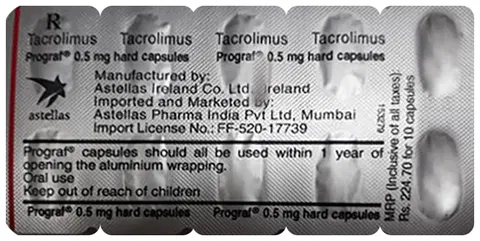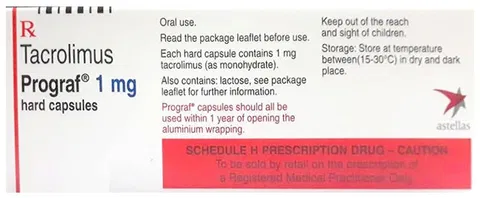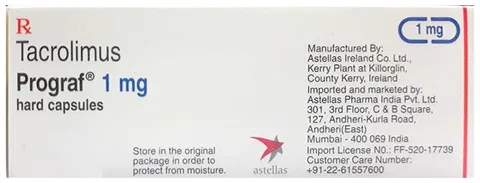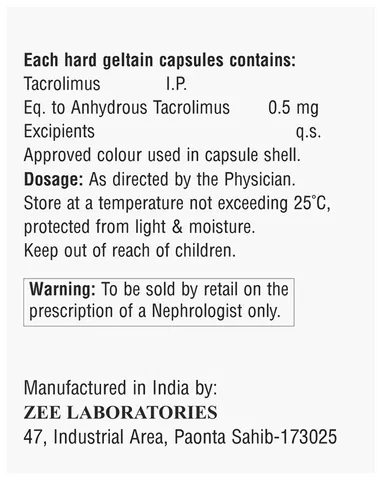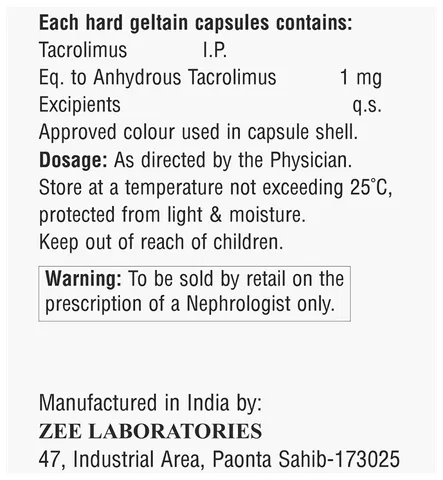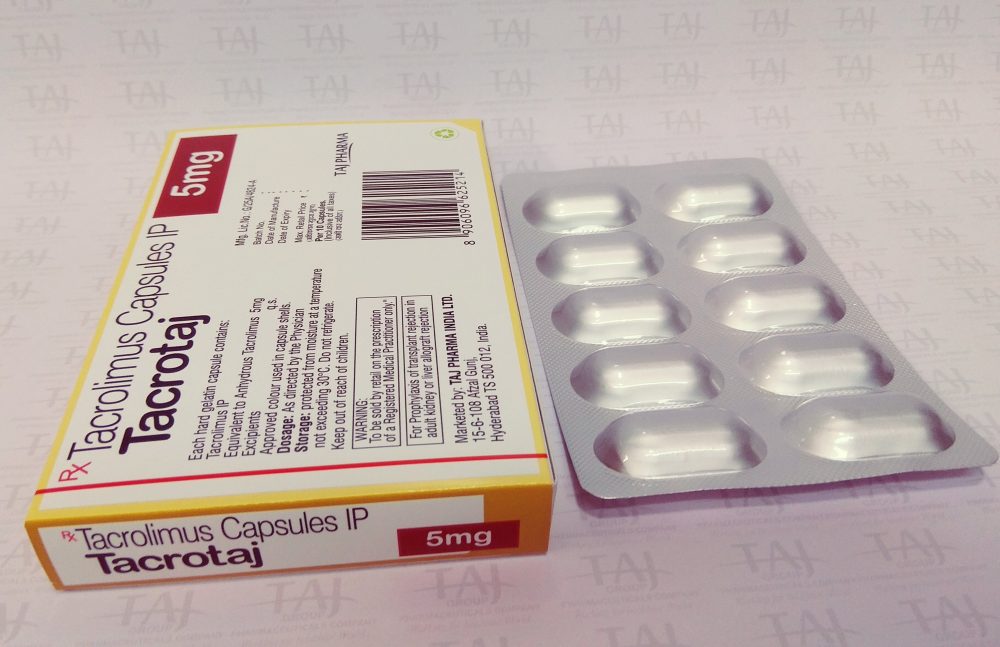Prograf (Tacrolimus) Capsule
Branded
Generic
Tacrolimus (Generic Equivalent to Prograf)
Tacrolimus (Generic Equivalent to Prograf)
Tacrolimus (Generic Equivalent to Prograf)
Tacrolimus (Generic Equivalent to Prograf)
Tacrolimus (Generic Equivalent to Prograf)
Tacrolimus (Generic Equivalent to Prograf)
Prograf Capsule is used along with other medicines to prevent your body from rejecting a new organ (e.g., liver, kidney, or heart) after transplant. It does so by weakening your body’s immune system, so it does not attack the new organ. This medication belongs to a class of drugs known as immunosuppressants.
The amount of Prograf Capsule you take and how often you take it depends on the type of transplant you have, your body weight, and what other medicines you are taking. Follow your doctor’s instructions carefully. You should take it on an empty stomach, at least 1 hour before or 2 hours after a meal. Take this medicine regularly to get the maximum benefit and keep taking it, even if you feel well. If you stop taking it, you may increase the chances of rejecting your transplanted organ.
Prograf Capsule has many potential side effects. It can cause or worsen diabetes and kidney and liver problems. These need urgent medical attention. Other common side effects include nausea, stomach pain, diarrhea, and difficulty sleeping. If the side effects do not go away or get worse, tell your doctor. Prograf Capsule lowers your immune system making you susceptible to catching more infections than usual.
Before taking this medicine, tell your doctor if you have kidney, liver, or heart problems, diabetes, or high blood pressure. Also let your doctor know what other medications you are taking, especially for infections, pain, and arthritis. These and others may affect, or be affected by, this medicine. You should limit your exposure to the sun and UV (ultraviolet) light while taking it because immunosuppressants could increase your risk of skin cancer.
Both men and women using this medicine should use effective birth control to prevent pregnancy. This medicine is not normally recommended during pregnancy or while breastfeeding unless it is clearly needed. Before and during treatment you will need frequent medical tests to monitor your progress, and your blood pressure will need to be checked often.
Uses Of Prograf Capsule
- Prevention of organ rejection in transplant patients
Benefits Of Prograf Capsule
In Prevention Of Organ Rejection In Transplant Patients
Prograf Capsule belongs to a group of medicines known as immunosuppressants. Organ rejection happens when your immune system treats the new organ as an invader and attacks it. This medicine weakens your immune response (which usually fights infection) and reduces the chance of your body attacking the transplanted organ. It is used in combination with other medicines to make it much more likely that your transplant operation will be successful. You should continue taking the medicine and should not stop it until your doctor says so.
Side Effects Of Prograf Capsule
Most side effects do not require any medical attention and disappear as your body adjusts to the medicine. Consult your doctor if they persist or if you’re worried about them
Common Side Effects Of Prograf
- Diarrhea
- Increased glucose level in blood
- Increased thirst
- Kidney damage
- Liver damage
- Nausea
- Stomach pain
How To Use Prograf Capsule
Take this medicine in the dose and duration as advised by your doctor. Prograf Capsule is to be taken empty stomach.
How Prograf Capsule Works
Prograf Capsule is an immunosuppressant. It works by suppressing your body’s immune response following the transplant of an organ (e.g., liver, kidney, heart). This helps your body to accept the new organ as if it were your own.
Disclaimer :The information provided on the website is intended to facilitate awareness about healthcare products and medical conditions generally but it is not a substitute for professional medical attention or advice. You should always speak with a qualified healthcare practitioner before taking any prescription or non-prescription drug. |
| Product Type--Salt | Generic–Tacrolimus (Generic Equivalent to Prograf), Brands–Prograf |
|---|---|
| tag--Manufacturer | Best Selling–Zeelab Pharmacy, Top Brand–Dr Reddy's Laboratories, Branded–Astellas Pharma, Best Selling–Zeelab Pharmacy, Top Brand–Globela Pharma, Branded–Astellas Pharma, Best Selling–Globela Pharma, Top Brand–Taj Pharma |
| Power--Pack Size | 0.5mg–30 Capsules, 0.5mg–60 Capsules, 0.5mg–90 Capsules, 0.5mg–180 Capsules, 0.5mg–30 Capsules, 0.5mg–60 Capsules, 0.5mg–90 Capsules, 0.5mg–180 Capsules, 0.5mg–30 Capsules, 0.5mg–60 Capsules, 0.5mg–90 Capsules, 0.5mg–180 Capsules, 1mg–30 Capsules, 1mg–60 Capsules, 1mg–90 Capsules, 1mg–180 Capsules, 1mg–30 Capsules, 1mg–60 Capsules, 1mg–90 Capsules, 1mg–180 Capsules, 1mg–30 Capsules, 1mg–60 Capsules, 1mg–90 Capsules, 1mg–180 Capsules, 5mg–30 Capsules, 5mg–60 Capsules, 5mg–90 Capsules, 5mg–180 Capsules, 5mg–30 Capsules, 5mg–60 Capsules, 5mg–90 Capsules, 5mg–180 Capsules |


